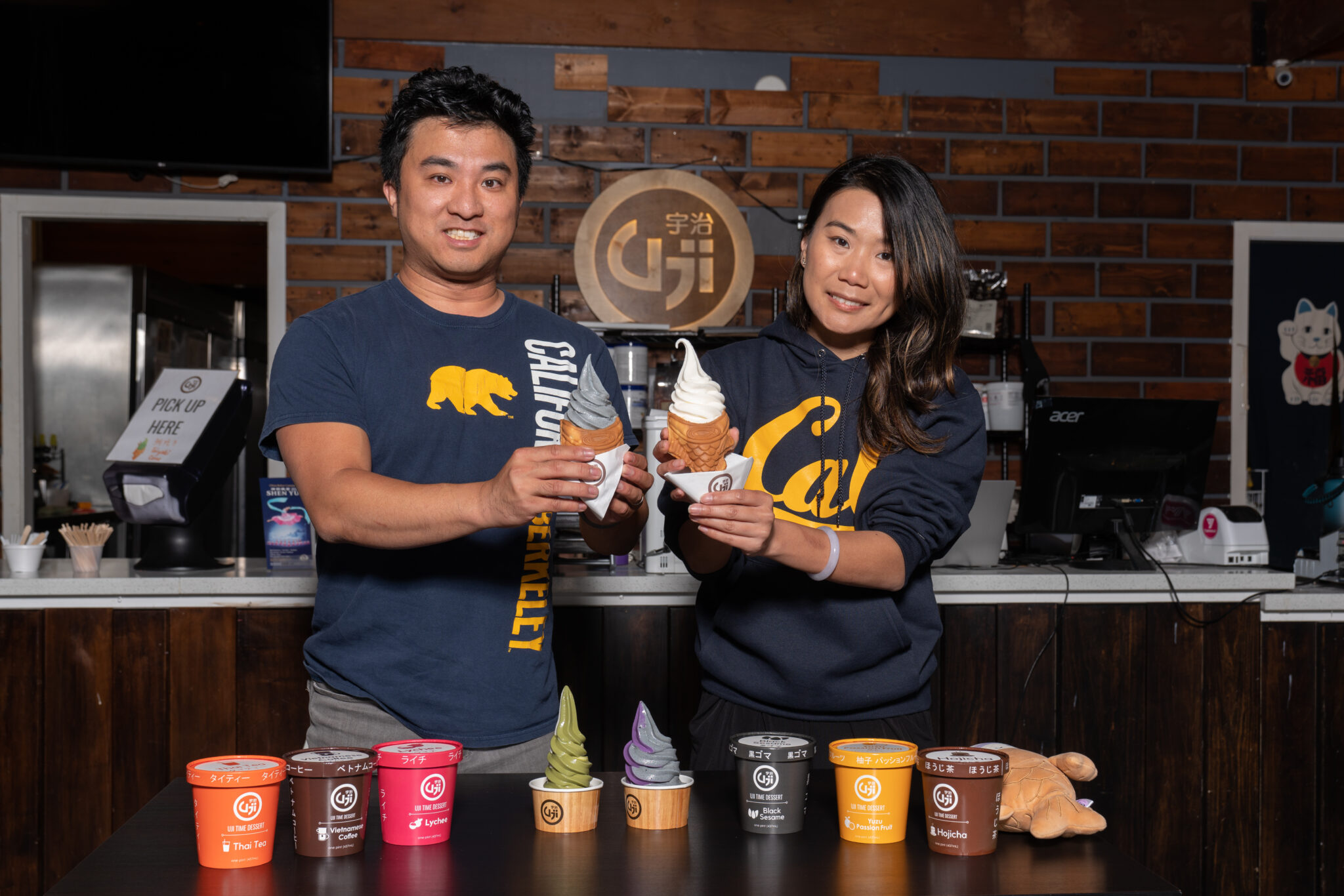When Sharon Ku ’08 transferred to UC Berkeley, Berkeley’s multicultural community immediately stood out to her. After graduation, Ku and her friends found a way to give back to that community through ice cream. In 2016, they opened Uji Time as a pop-up shop on Telegraph Avenue that sold Japanese-style taiyaki fish-shaped cones with Asian ice cream flavors. Since its opening, Uji Time has expanded its menu to include other Asian desserts and treats and opened other dessert cafes in the Bay Area and Washington.
Ku is now the CEO of Uji Time—on top of her day job as a dietician—and Uji Time continues to serve taiyaki soft-serve ice cream to the UC Berkeley/Telegraph community. The Cal Alumni Association interviewed Ku about how her nutritional science major helped start Uji Time, why Berkeley was Uji Time’s trial location, and, of course, ice cream.
Cal Alumni Association (CAA): Tell me a little bit about your story. What was your journey to Cal?
Sharon Ku (SK): I was a new immigrant from Hong Kong and I came [to the United States] when I was nineteen years old. Then I transferred to Cal. After Cal, I took a few years off to get my RD license, the registered dietician license. Because of my nutritional science major, I had some basic knowledge about food. After a few years, I met a few friends interested in operating an ice cream business.
I told them that I could help to create the brand and help with the recipes or the workflow or anything that is related to food. While I was [at UC Berkeley], I took food science and the ServSafe® Food Manager Certification. All my friends from nutritional science could help taste all the ice cream flavors, to give me food feedback on how we can make it better.
CAA: What were some food skills you learned while studying nutritional science at Berkeley?
SK: My nutritional science major had a food lab class. Every week, we’d have to bake five to six loaves of bread and see how [changing one part of the process] will affect the quality or the overall outcome. One of the projects was like a ginger milk curd. It’s like a very traditional Hong Kong dessert. You boil the milk and you add the ginger—fresh ginger—in it. After a few minutes, it will form a pudding. All this was really interesting to me. I learned [through this Berkeley class] how to change the recipe to get the texture and the flavors that I want.
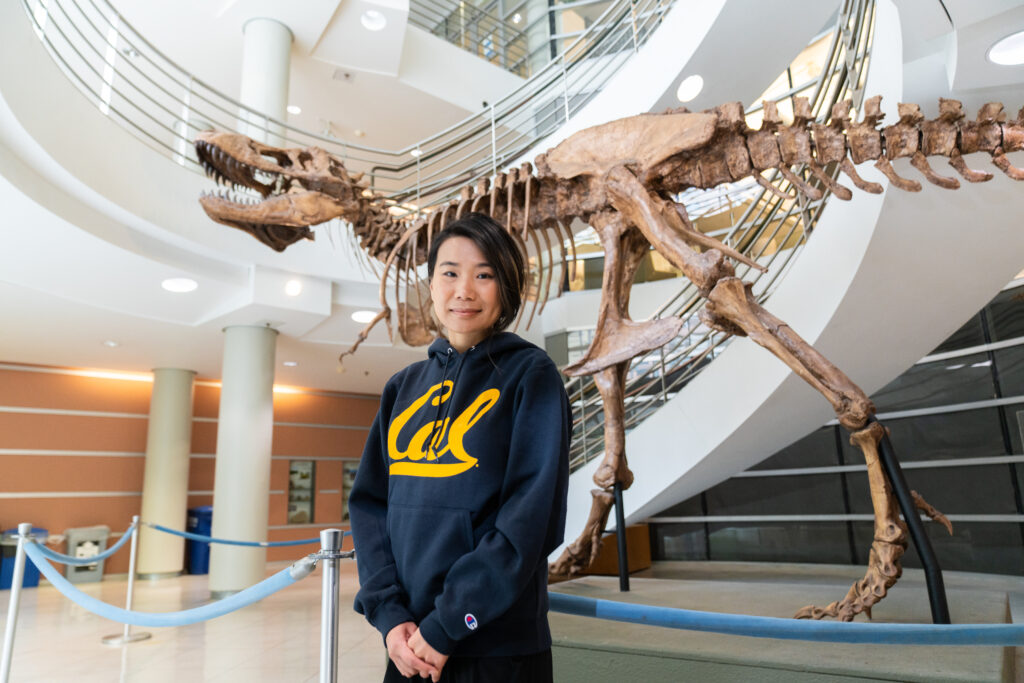
Besides that, we also had a food service management class. We did a lot of field trips to different UC Berkeley dining halls. We went there for tours to observe what kinds of equipment they used and all the standard protocols, how they make sure all the food is served safely.
That class also brought us to one of the biggest [food distributors]. We’d see how they store all the food, how they distribute food, and how they organize it in the warehouse. I really liked those kinds of classes more than the clinical part [of nutritional science].
CAA: How did you apply that process you learned at UC Berkeley to creating Uji Time’s batches of ice cream and figuring out the flavors?
SK: We started in 2016 and we only had soft-serve ice cream. We were the first ones to sell taiyaki ice cream in the Bay Area. When we were testing out all the flavors, we’d use the same base and change the flavors every time to adjust it. In the beginning, we only had matcha and black sesame. Then we figured we’d have tofu and seasonal flavors. Because of the taiyaki cone, we wanted to make [the cone] crispy. My partner also helped to change the recipe. I would give them ideas [for flavors] and [the people making the ice cream] would physically help to modify the recipe and create it.
Everyone liked it so much in the beginning. I think people waited 30 minutes, or maybe 45 minutes, to get a cone. I felt so bad for them that they have to wait for that long! But we were so new to the business. We have been brainstorming and trying to improve the workflow.
CAA: How did COVID-19 affect Uji Time’s business?
SK: After [the COVID-19 shelter-in-place order], we could not sell the softer ice cream. We had to start to think about how we can package it. I am very lucky to have found a co-packer who is willing to let us use the facility. So, one of my partners and I spent three to four weeks developing all the flavors [for packaged ice cream].
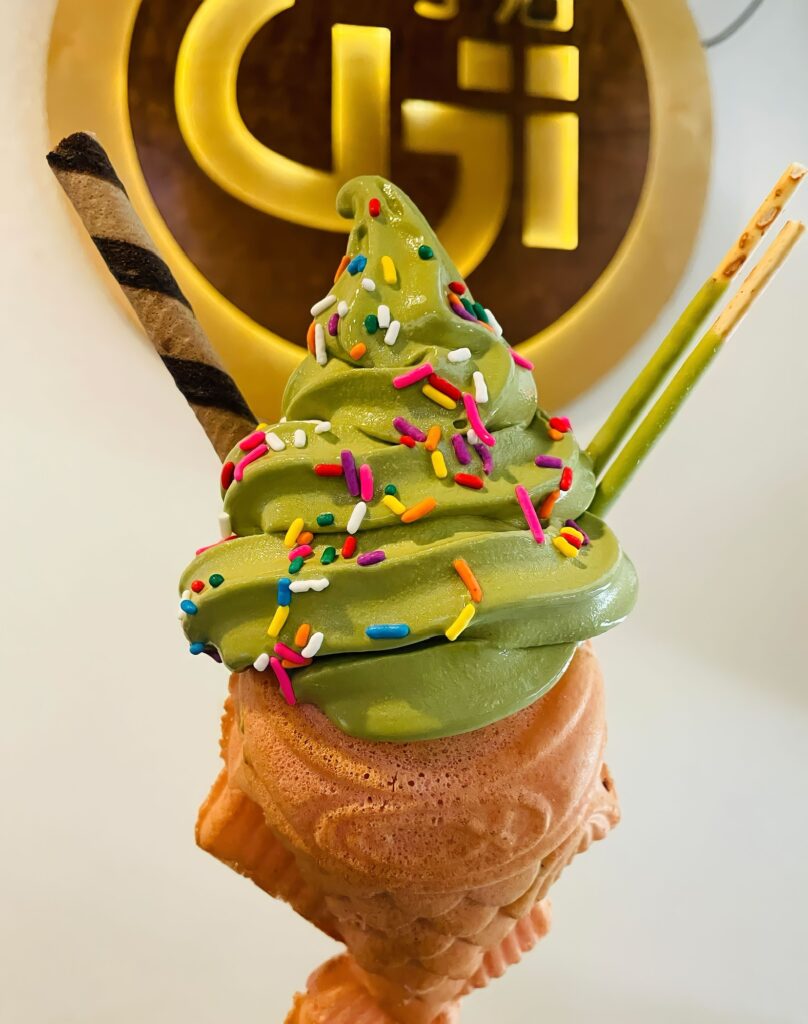
My food science background here helped me a lot. For example, if the ice cream is too soft, or maybe if it’s too dense, what should I do? I need to add more air to it. Or can I cut down on the sugar? Because our flavor is really delicate, if we add too much sugar, it will overpower and we only can taste “sweet” but not the actual flavor. So we try not to add too much sugar to it. But it still has a lot of fat in it! The fats I cannot control much because there’s a standard for the ice cream. It has to be a certain percentage in order to call it ice cream, otherwise, we cannot call it ice cream. We’d have to call it another name. So the fat level I cannot control, but the sugar level I can.
Now you can tell that some ice cream is heavier than others. It’s because of the air. For our flavors, we have to make it even stronger so that it’s more fluffy and stronger in taste and some ice cream is more dense. So there is so much food science in the background that we are trying to learn and understand.
CAA: Why Telegraph in Berkeley for your first store location?
SK: I graduated from Berkeley and I feel that there’s more energy here. People are willing to try different types of food. I really appreciate the multicultural environment here. Everyone respects each other and they would give us feedback, and I feel safe to have a business around here for the first business.
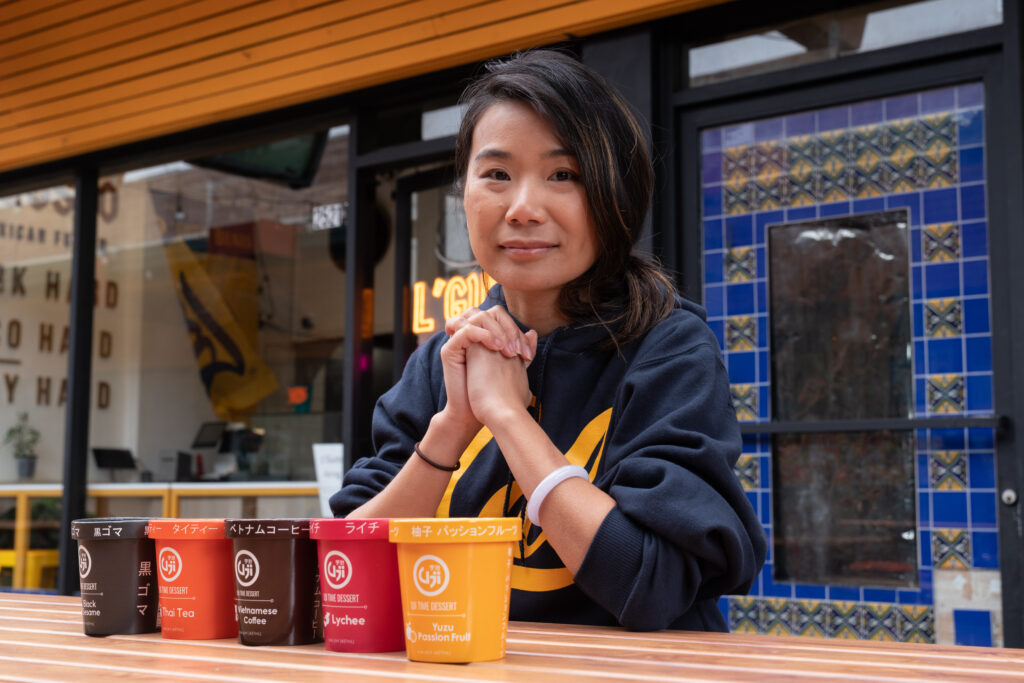
When I was here [as a student], it was already diverse with a lot of Asians and everyone respected each other. It’s really sad, I still remember when I first came to the United States, all of a sudden someone might say, “Go away Chinese.” That kind of hurt my feelings. But here [at Berkeley], I can tell everyone respected each other and respected everyone’s culture.
That’s why I drove around [Telegraph Avenue]. I drove to see if there was any store that was empty or available. I approached the owner [of our current building] and said, “Hey, can we try to do a pop-up idea at the store? We can share the rent. We can share the space.”
It’s just like a test model in the beginning. And all the students, they’re curious. They used social media and helped us to promote the business, too. Later on, it was a great success, and we are able to take over the whole store and keep running until now.
CAA: Could you also share about the ways Uji Time tries to give back to the campus?
SK: Well, any clubs that approach us—if they email us, call us, or leave a note in [the Berkeley store]—I would just say “yes” for any donation asked. We donate, we give certificates, and sometimes we donate money.
We also help them to do different events. Three months ago, the Cal Animage Alpha club wanted to do a maid cafe. They dressed up like a maid and served ice cream or desserts to customers. It’s one of the fundraising events. It was really great.
Another time [a club] came here to rent our store to do some party. We are okay with that too, as long as they keep it clean and it’s not against any regulations. The space that we have is always available for Cal students. If they want to do meetings, anything, if they approach us, we pretty much say “yes.”
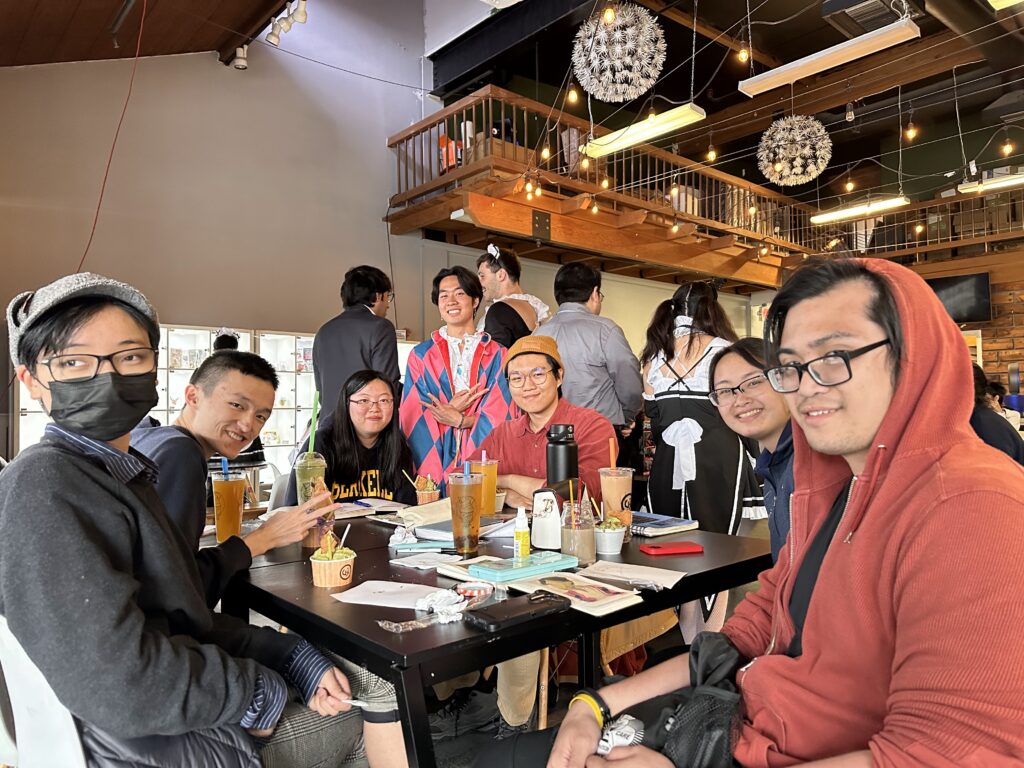
I hope that they will keep coming back because it’s a win-win situation for everyone. We can help them and also they can help us to promote a business also.
CAA: It’s a very unique decision to use an ice cream shop to encourage multiculturalism. How do you see Uji Time’s mission and ice cream meeting?
SK: We try to offer the flavors that we like, and we hope that all of our customers like what we like. We just made durian, ginger, and a lot of different types of Asian spices.
I hope people would like to try it so they understand what the other flavor is. After you try it, if you don’t like it, that’s okay. But just give it a try. I just want everyone to—don’t close the door right away.
Now we’ve been trying to promote Uji Time and hope that everyone in the Bay Area will like our ice cream flavors. And whenever we have a new flavor, I hope they would like to come and try it because of the good quality that we have maintained for all the other flavors.
CAA: On the topic of flavors, were there any flavors that were specifically inspired by UC Berkeley?
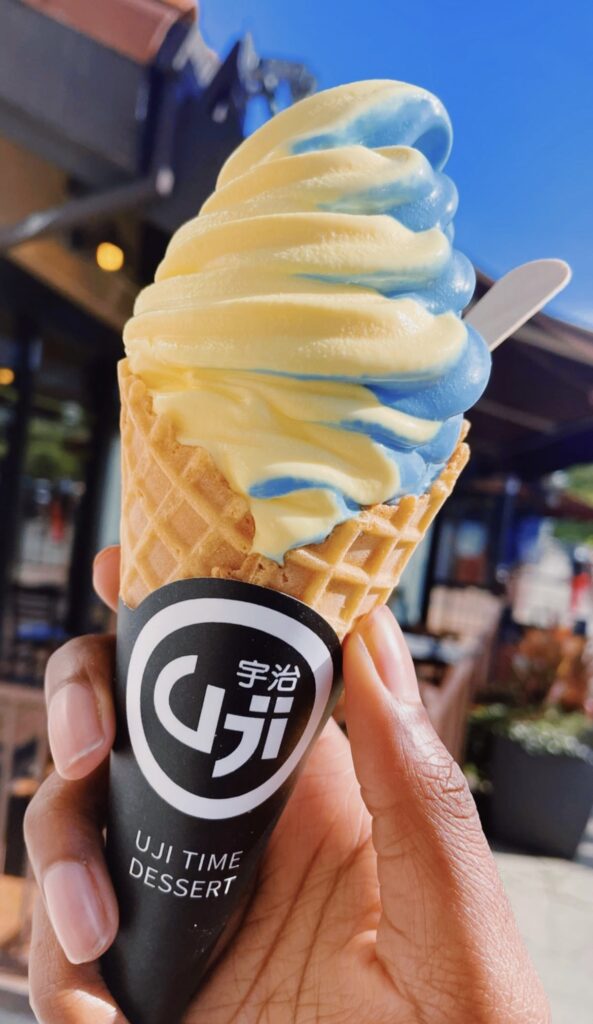
SK: Two months ago, we talked about creating a blue and yellow ice cream for Cal, homecoming week, and maybe graduation ceremony week. We will have those as special colors. Yellow is banana and blue is vanilla. Vanilla and banana. They do well with each other. It’s just a coloring, so we always can change the flavors. But it’s something really fun.
CAA: Do you think that starting a dessert place like Uji Time could have happened elsewhere besides Berkeley?
SK: It could have. But I graduated from here. As I said, I feel secure and more safe to start a business here. And I feel like I can find more resources here if I need help with. And I always think that the city of Berkeley has a better system to help new investors or new business owners.
At UC Berkeley, we have new students coming in every year. It means that we have new visitors, we have new customers. It works here because of all the support from the students. [Students] will refer their friends back.
Later on, when they work in different companies, they would think about us. “Oh, I tried your ice cream.” It’s happened a few times, they come back and say, “Hey, I wanna do catering.” Oh wow. “Can you join us for the company event?” A lot of graduates here are still working in the Bay Area and they still remember our ice cream.
CAA: What would you advise incoming Cal students today as they are preparing to navigate UC Berkeley?
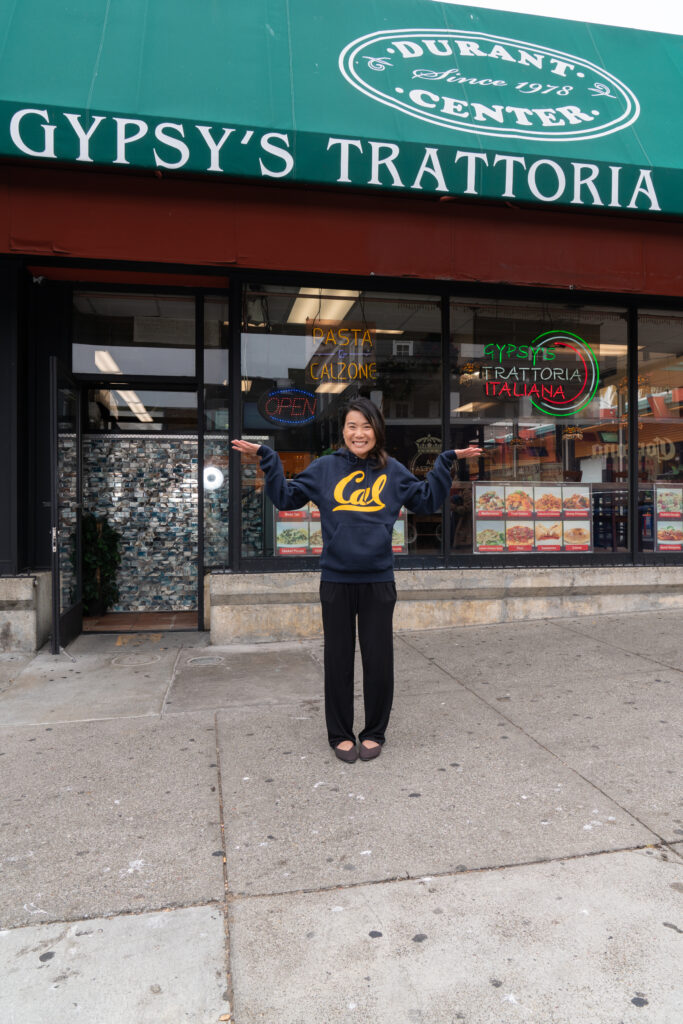
SK: Everything is possible. If you want to move forward to your goals, do not think that it’s too hard to reach. You never can prove it unless you try it. Just try to do everything and you can resolve all the problems step by step.
I do see a lot of students or maybe a lot of teens—they gave up. Like they give up really easily because it’s too much, it’s too far away. But just try your best. We also learn from failure. It’s just a learning process. So you don’t give up.
[For me at Uji Time] there are always things that don’t work out. Like the machine broke down, what should I do? Or maybe we’re out of power. So that’s something we cannot control, but at that point what we can do is just explain to the customer, “This is the situation, but I do have some other things I can offer to you.” Maybe a drink, maybe some other mochi ice cream that we can offer to the customer.
So we try to think about what we can offer even though the situation is bad. I think that’s the mentality. We just have to keep positive and move towards the goal and try to do what we can to help the customer. Just don’t say no, but try to think, “What can I do at this moment to make it better?”
Learn more about Uji Time.
How does your Cal experience inspire you today? Share your story with us!






